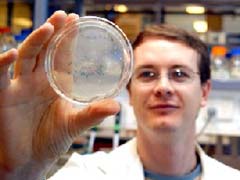
Current methods of predicting short-term intake of pesticide residues by humans should be improved, according to a new study published in the journal Pest Management Science.
In the article, researchers from around the world come together to review existing safety measures and make eleven recommendations based on their research. Studies suggest that a single, or short-term exposure can affect health, as well as long term exposure.
‘The publication will prove an invaluable resource

A team of researchers at the University of California, Davis, has pieced together a clearer picture of how wheat has been able to adapt to such a wide range of climates and become one of the world’s staple food grains.
They accomplished this by isolating and cloning the VRN2 gene in wheat, which controls vernalization — the cold-weather requirement for triggering flowering. The findings of the study, which have practical implications for improving wheat varieties through manipulation

In a world first CSIRO Plant Industry has discovered a gene that is the ’Achilles heel’ of rust, a common disease of plants, which could save millions in breeding rust resistant plants and avert losses in food production.
“You can breed rust resistant plants, but this resistance only works when the rust fungus contains the gene we found – the ’avirulence’ gene,” says Dr Peter Dodds, CSIRO Plant Industry.
Without existing rust resistant wheat varieties Australia&#

Triticale is a hardy and new winter cereal crop created in a laboratory environment by crossing wheat with rye. After years of effort over a 30-year period, plant breeders, in particular those at INRA (France’s National Institute for Agronomic Research), have succeeded in making this species very attractive to farmers. Indeed, Triticale is today producing yields equivalent to, or better than, those for wheat.
Annaig Bouguennec, INRA’s researcher in charge of the triticale programme, explain

The latest trials of a Graingene-bred water-efficient wheat variety have shown it has the potential to add millions of dollars to the value of the NSW wheat crop. In 12 independent field trials held across New South Wales in 2003, Drysdale wheat yielded an average of 23 per cent more grain than the current recommended variety Diamondbird, despite very dry conditions.
“If Drysdale was sown throughout southern and central New South Wales, it could add hundreds of millions of dollars to the ave

A study published in the Vadose Zone Journal examines how different soil types affect Cryptosporidium parvum’s transport.
Groundwater is generally considered a safe source of drinking water because pathogens are presumably filtered out during their transport through unsaturated soils. Nevertheless, pathogen-contaminated groundwater has been the cause of many disease outbreaks in the last 10 years including cryptosporidiosis caused by the protozoan pathogen Cryptosporidium parvum.